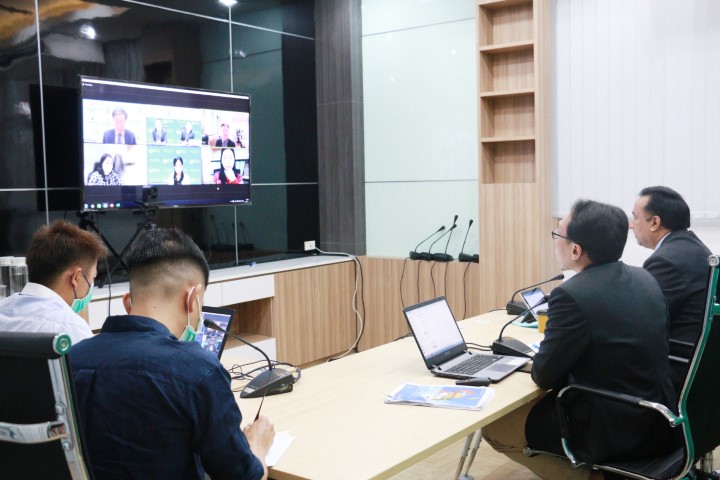To address the shortage of drinking water in rural communities, the Seoul National University R&DB (SNU R&DB) formally launched the ‘Promotion of Innovative Rainwater for Drinking (RFD) System as a Sustainable Water Supply in Rural Schools’ project in a virtual meeting on February 4, 2022. To be implemented in selected schools in the five Mekong countries of Cambodia, Lao PDR, Myanmar, Thailand, and Vietnam, the project is funded by the Mekong-Republic of Korea Cooperation Fund (MKCF), through the fund management and coordination of the Mekong Institute (MI).
“Access to safe drinking water is limited in the Mekong region, particularly in the rural areas,” Mr. Madhurjya K. Dutta, MKCF coordinator and Director of Trade and Investment Facilitation Department of MI, shared in his special remarks. In the context of climate change and its increasing impacts in the Mekong counties, Mr. Dutta emphasized the need for equitable and sustainable water resource management technologies that will facilitate the provision of and access to drinking water.
To offer a sustainable solution to the problem of drinking water shortage among rural schools in the Mekong countries, Dr. Mooyoung Han, professor in SNU R&DB and the project manager, introduced the project concept and its implementation strategy. In the proposed project sites, the project team will pilot an RFD facility, which turns rainwater into drinking water. The RFD system features a rainwater harvesting technology that involves collection of water from rooftops, conveyance systems, and water treatment using nature-based solutions.
Aside from technological advantages, Dr. Mooyoung also shared the economic and social benefits of the RFD system, particularly the use of local materials and labor, self-monitoring, and participatory and community-based orientation. Dr. Mooyoung also enumerated the steps that the project team will undertake in order to implement the project, such as site survey and selection, design and construction of RFD, handover the facility, training on operation and management, testing and monitoring, training and communication activities, and sharing project highlight through the media.
very much aligned with the concept of MKCF of bringing technological experience and expertise in critical areas where the Republic of Korea (ROK) has demonstrated excellence in developing solutions.
Mr. Dutta complimented the project concept and approach for being
He added that this experience sharing and technology collaboration through capacity building are of significant importance to the well-being of Mekong countries. He also stressed that aside from supporting decision makers and planners, introducing a financial model in this project will ensure the sustainability of the initiative.
In his special message, Dr. Haecheon Choi, SNU Vice President and Chair of SNU R&DB, congratulated the team for the successful project launch. He wished that “the success of the project will trigger the promotion of the RFD system, not only in Mekong countries, but to the rest of the world contributing to the UN sustainable development goals.”
Ms. Chung Kyunghwa, Director of Southeast Asia Division II of the Ministry of Foreign Affairs of ROK, underscored in her special remarks, that this project is one of the manifestations of the strong Mekong-ROK cooperation in promoting sustainable development in the region. She stressed that “the project contributes to the four out of the seven priority areas of the Mekong-ROK cooperation, namely environment, rural development, non-traditional security challenges, and human resource development.”
Towards the latter part of the meeting, Mr. Robby Rosandi of MKCF and Ms. Phinyada Foytong of the Finance Department of MI presented the MKCF project monitoring and reporting guidelines.








